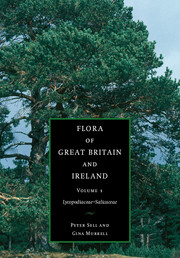Summary
Much of what is in this flora is owed to the great historic background to plant taxonomy here in Cambridge. One cannot but feel that one is following in a great tradition when studying the British and Irish floras in the Cambridge University Herbarium, its Library and the University Botanic Garden and when using them to work out the results of one's fieldwork.
When the modern western world took shape after the so-called Dark Ages it was France, Germany, Italy and the Low Countries that produced the pioneers of the science of botany. The medievalists were remote from any scientific appreciation of nature. An example of the work of a Cambridge scholar towards the end of that period is the book by John Maplet, A greene forest, or A naturall historie vvherein may bee seene first the most sufferaigne vertues in all the whole kinde of stones & mettals: next of plants, as of herbes, trees, shrubs, lastly of brute beastes, foules, fishes, creeping wormes serpents, published in 1567. It would be thought that by then the Renaissance and Reformation would have been established, but in thought this book is purely medieval. The breakdown of medieval ideas in England was to start at Oxford and then to be transferred to Cambridge, and it was the spirit of Erasmus in his writings, and above all in his edition of the New Testament, that gave an impetus to Greek studies and a new understanding of classical civilisation in the University.
Two men at Cambridge, William Turner and John Caius, can properly be said to have started the long line of field naturalists in Britain. Both studied in Italy and both were friends of the great Zurich naturalist Conrad Gesner. Of the two, William Turner was by far the more important botanically, being one of the most vigorous of reformers and our first scientific student of botany and zoology.
William Turner (1508–1568) was born at Morpeth in Northumberland and as a boy was said to notice the ways of animals and plants. In 1526 he went up to Pembroke Hall in Cambridge, where he stayed until 1537 and published a number of works. His teachings as a reformer got him into trouble and he went abroad, whether by order or his own choice is not known. He visited Belgium, Holland, Germany, Italy and Switzerland.
- Type
- Chapter
- Information
- Flora of Great Britain and Ireland , pp. xv - xxvPublisher: Cambridge University PressPrint publication year: 2018



